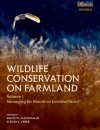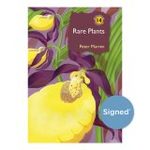About this book
Using more than 30 years research from the author team at the Wildlife Conservation Research Unit (WildCRU), Wildlife Conservation on Farmland, Volume 1: Managing for Nature in Lowland Farms reveals how agricultural systems and wildlife interact, presenting examples from scales varying from landscape to microcosm, from populations to individuals, covering plants, invertebrates, birds, and mammals. It demonstrates the essential ecosystem services provided by agricultural land, and discusses the implications of agricultural development for natural habitats and biodiversity.
Contents
1: David W. Macdonald, Eva M. Raebel and Ruth E. Feber: Farming and wildlife: a perspective on a shared future
2: Helen Smith, Ruth E. Feber and David W. Macdonald: From weed reservoir to wildlife resource: redefining arable field margins
3: Ruth E. Feber, Paul J. Johnson, Fran H. Tattersall, Will Manley, Barbara Hart, Helen Smith and David W. Macdonald: How can field margin management contribute to invertebrate biodiversity?
4: David W. Macdonald, Lauren A. Harrington, Merryl Gelling, Fran H. Tattersall and Tom Tew: Small mammals on lowland farmland
5: Jeremy D. Wilson and Richard B. Bradbury: Agri-environment schemes and the future of farmland bird conservation
6: Ruth E. Feber, Paul J. Johnson, Dan E. Chamberlain, Leslie G. Firbank, Robert J. Fuller, Barbara Hart, Will Manley, Fiona Mathews, Lisa R. Norton, Martin Townsend and David W. Macdonald: Does organic farming affect biodiversity?
7: Hanna L. Tuomisto, Ian D. Hodge, Philip Riordan and David W. Macdonald: Farming for the future: optimising farming systems for society and the environment
8: Thomas Merckx and David W. Macdonald: Landscape-scale conservation of farmland moths
9: Danielle Linton, Lauren A. Harrington and David W. Macdonald: Habitat use by vesper bats: disentangling local and landscape scale effects within lowland farmland
10: Eva M. Raebel, David J. Thompson and David W. Macdonald: Local and landscape scale management of Odonata
11: Rosalind F. Shaw, Alison E. Poole, Ruth E. Feber, Eva M. Raebel and David W. Macdonald: Freshwaters and farming: impacts of land use and management on the biodiversity of rivers and ditches
12: Christina D. Buesching, Eleanor M. Slade, Thomas Merckx and David W. Macdonald: Local and landscape-scale impacts of wooded habitats and their management on wildlife
13: Elina Rantanen, David W. Macdonald, Nick Sotherton and Francis Buner: Improving reintroduction success of the Grey Partridge using behavioural studies
14: Tom P. Moorhouse, Merryl Gelling and David W. Macdonald: Water vole restoration in the Upper Thames
15: Tom Moorhouse, David W. Macdonald, Rob Strachan and Xavier Lambin: What does conservation research do, when should it stop, and what do we do then? Questions answered with water voles.
16: Christopher J. Sandom and David W. Macdonald: What next? Rewilding as a radical future for the British countryside
Customer Reviews
Biography
Edited by David W. Macdonald, Professor of Wildlife Conservation and Director of the Wildlife Conservation Research Unit, Department of Zoology, University of Oxford, and Ruth E. Feber, Wildlife Conservation Research Unit, Department of Zoology, University of Oxford




































